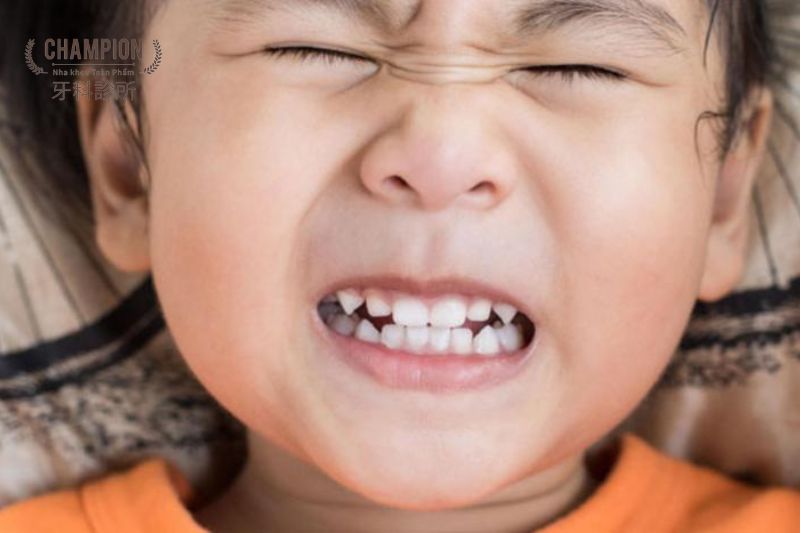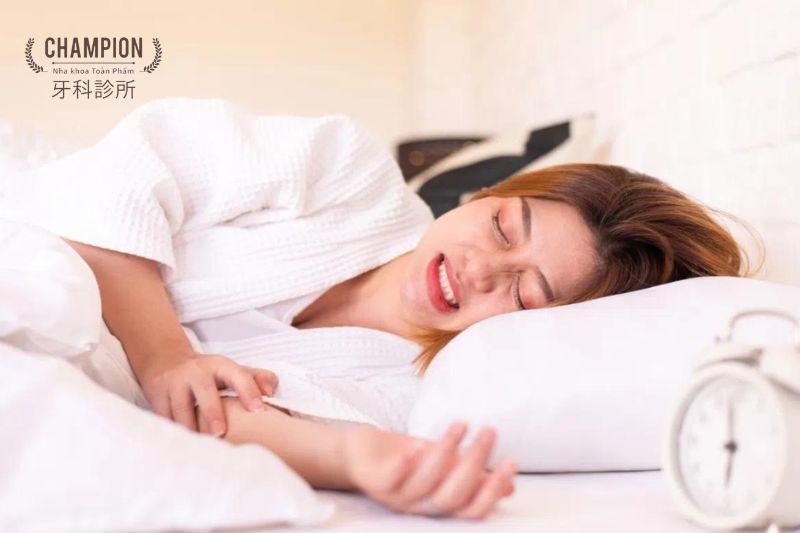Teeth grinding during sleep is known as a sleep movement disorder, occurring in both adults and children. It not only causes discomfort for the sleeping individual but also indicates underlying conditions, and in severe cases, may even lead to sleep apnea. So, what are the causes of teeth grinding during sleep and how can it be effectively treated? All of these questions will be answered in detail by Champion Dental Clinic in the following article.
What is Teeth Grinding During Sleep?
Teeth grinding, a common phenomenon often overlooked for its serious implications on oral health, involves the forceful contact of upper and lower teeth, resulting in a grinding sound and potentially exerting significant pressure on both teeth and the jawbone structure.
Teeth grinding during sleep typically occurs when the individual is not awake and cannot control jaw movements. This can happen for various reasons, including stress, bite disorders, allergies, or even improper sleeping positions.
During teeth grinding, the jaw muscles act irregularly and uncontrollably, leading to clenching or grinding without the purpose of chewing food. This not only causes discomfort but can also result in pain and damage to the teeth and gums.

Causes of Teeth Grinding During Sleep
The causes of sleep teeth grinding can encompass a range of factors, from psychological issues to medical conditions and lifestyle choices. Here are some common causes:
- Chronic stress and tension: Feelings of stress and pressure in daily life can cause the jaw muscles to react by grinding and clenching during sleep.
- Dental and jaw-related issues: Uneven jaw and tooth structures can contribute to sleep teeth grinding. Misaligned bite and jaw discrepancies can lead to bruxism.
- Sleep disorders: Insomnia, sleep apnea, or restless leg syndrome can induce teeth grinding during sleep. Lack of sleep and shallow sleep can increase the risk of bruxism.
- Stimulant use: Excessive consumption of caffeine, tobacco, or alcohol can affect the nervous system and trigger uncontrolled jaw movements during sleep.
- Side effects of certain medications: Some medications such as antidepressants, anti-anxiety drugs, and erectile dysfunction medications may cause sleep teeth grinding as a side effect due to the influence of chemical components in the drugs.
- Psychological issues: Anxiety, depression, psychological stress, or behavioral issues like frustration and anger can lead to teeth grinding during sleep as a physical manifestation of stress and discomfort.

>> See more: Overcrowded Teeth in Adults: How to Treat Them Safely?
What are the Effects of Teeth Grinding During Sleep?
Teeth grinding during sleep not only poses issues for oral health but can also negatively impact the overall health of the patient and those around them. Here are some common adverse effects of frequent sleep teeth grinding:
Misalignment of the temporomandibular joint
Sleep teeth grinding can lead to misalignment in the structure and function of the TMJ, causing symptoms of temporomandibular joint disorder. This not only causes pain but also affects the ability to open and close the mouth, reducing the patient's quality of life.
Negative impact on gums and tooth enamel
Teeth grinding can result in issues like yellowing of teeth, gum inflammation, and other related conditions. The continuous friction of teeth during grinding can damage tooth enamel and lead to gum inflammation, creating conditions for bacterial growth and oral diseases.
Facial pain and swelling
Individuals who grind their teeth during sleep often experience facial pain and swelling due to imbalanced pressure on facial areas. Jaw pain is also a common symptom observed in those who grind their teeth during sleep.
Tooth sensitivity and erosion
Continuous friction during teeth grinding can make teeth sensitive and prone to erosion. This can lead to problems such as tooth sensitivity and increased risk of dental issues like cavities and gum inflammation.

Effective Tips for Treating Sleep Teeth Grinding
Here are some effective home remedies for treating sleep teeth grinding in both children and adults:
Drink warm milk to reduce teeth grinding
Drinking warm milk mixed with turmeric powder before bedtime can promote better sleep and reduce teeth grinding. Tryptophan in milk helps relax the nervous system, and curcumin in turmeric has antidepressant properties.
Use a teeth grinding guard
Wearing a teeth grinding guard at night is a common method to limit teeth grinding. This guard helps reduce pressure on teeth and bite joints, thus reducing the risk of teeth grinding.
Practice relaxation exercises
Activities like yoga, deep breathing, and taking a hot bath before bedtime can help reduce stress and alleviate fatigue, thereby reducing the risk of teeth grinding during sleep.
Change lifestyle and habits
Changing dietary habits by limiting hard foods and practicing stress-reducing measures like exercise and meditation can also help reduce teeth grinding.
Treat dental and jaw-related issues
If teeth grinding is related to structural issues with the jaw and teeth, seek advice from a dentist for effective treatment.
Muscle relaxation and jaw massage
Performing muscle relaxation exercises and jaw massage before bedtime can help reduce tension and decrease the risk of teeth grinding during sleep.
Treat sleep-related issues
If teeth grinding is related to sleep disorders, seek advice and treatment from specialists to address the root cause of sleep teeth grinding.
Conclusion
Teeth grinding during sleep not only affects oral health but also gives rise to other health-related issues and affects quality of life. To timely detect, treat, and prevent the dangerous effects of sleep teeth grinding, please contact Champion Dental Clinic to receive dedicated treatment from our caring dentists!
Vietnamese & English: (028) 5411-2295
中文: (028) 5411-2297 172 Nguyen Luong Bang, Tan Phu Ward, District 7, Ho Chi Minh City.
Fanpage: Champion Dental Clinic 牙科診所
Zalo: Champion Dental Clinic
Youtube: Champion Dental Clinic 牙科診所
 Champion Dental Clinic
Champion Dental Clinic



